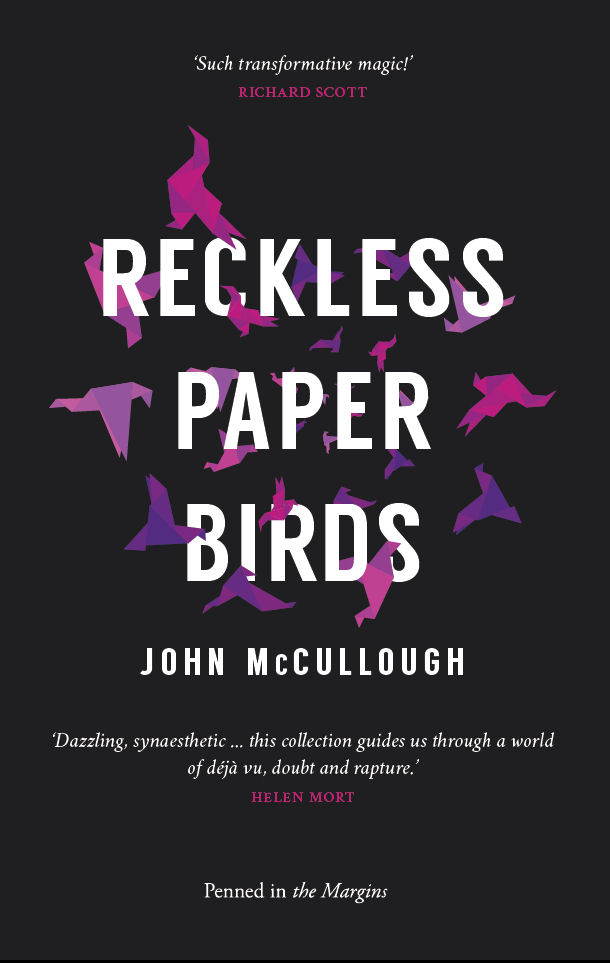To understand the weight of being bodied,
All the swollen and tender exchanges
That ground me here among the living
(‘A Floating Head’)
There is a powerful sense of tension between body and soul in John McCullough’s absorbing third collection, Reckless Paper Birds.
The human body and brain can be a prison; they are both susceptible to unhappiness and poor health, and society can impose all manner of hurt and violence on the body’s ‘cuttable flesh’. McCullough’s poems respond with an imaginative counterforce in terms of an internal urge to escape; they are full of images of birds and flight that serve as a means of liberation. These ideas are explicitly addressed in the poem ‘Tender Vessels’, where bodies become birds, ‘blowing kisses as we speed / through the air together’.
McCullough understands physical vulnerability and knows how the body is open to attack. The homosexual body, in particular, has long been an object of scrutiny and judgement:
I keep trying to slip away through the crowd
but history won’t take its mouth off my body.
Violence is never far away, and even the merest touch can seem ominous: ‘The unspeakable / scrapes a fingernail across my neck’. Modern distractions can soothe a little(‘I wind up decanting / myself into the nearest fizzing light: Instagram, / house music’), but these are only a temporary ‘spray-on cast for broken bones’.
As with his earlier collections, McCullough consistently demonstrates a gift for moving between registers, contrasting moments of seriousness with those of humour. Here the metaphysical rubs shoulders with Lady Gaga, Kate Bush and Grindr. While Andrew McMillian wrote Physical, McCullogh’s Reckless Paper Birds is perhaps its Metaphysical counterpart. In the poem ‘Silkworms,’ Renaissance philosophers turn up at the club: ‘Montaigne called the mind a silkworm, entangling itself in its / thread. / He came to the disco five centuries too soon’. It’s this quirky sense of different worlds overlapping that makes the poetry vibrant, but it’s the bird imagery which is, of course, the key to unravelling these poems.
In ‘Flock of Paper Birds,’ torn pages from the Bible are used for origami: ‘I needed the God of my childhood to be useful / so I folded him, shaped his pages into wings,’ – hence the creation of the titular ‘reckless paper bird’. The poem continues: ‘I fractured Leviticus with pleats / Now toucans mount doves’. In the book of Leviticus, Christian teaching outlaws sex between people of the same gender, so the reference to ‘mount’ is significant. The poem also underpins McCullough’s fascination with language, where Biblical words are literally re-shaped, to become transformed into something else(‘I pinched edges, split clauses to make plumage’). This new language becomes a means of reinterpreting the body and desire: ‘I guide my tongue along warm creases / and the tight sheet of his body unfolds.’ The paper birds now ‘discover their throats and sing together’, with a new liberated voice made from an authoritarian text. There are bold birds in this collection, unafraid and unashamed to spread their wings, such as those in ‘Flamingo’ whose voice is clear: ‘Our origin is in fire. We are invincible’.
Away from the image of flight, life on the ground is tough and unforgiving, as shown in ‘Michael.’ This is a poem based on the experience of rough sleeping in McCullough’s home city of Brighton, where a large proportion of young homeless people identify as LGBT. The poem is full of questions that are cryptically answered by Michael: ‘Which of the local attractions have you liked the most? / The eyes growing in clusters on trees that open gradually, and / hold a gaze’. I couldn’t help but imagine those ‘eyes’ belonging to passers-by staring at a young homeless man. Here Michael is completely reliant on the streets for his existence – he is earthbound. Compare this with the opening poem, ‘The Zigzag Path’, which also has an earthbound feel. A robin builds a ‘nest inside a Reebok’, and a ‘whisper […] says I can, I can, I can’, implying an urgent need to fly away and escape.
Reckless Paper Birds is certainly McCullough’s most personal collection to date and perhaps the bravest in terms of exploring the tensions between body and soul. The poetry of reckless flight is joyful – it offers freedom and life, in contrast to the suffering and frailty of the body, which must eventually die McCullough alludes to this in his final poem, ‘The Skeleton Flower’ and his imagery provides a chilling memento mori: ‘and I stare / heavy petals of my hands / that are turning slowly white’.

Buy Reckless Paper Birds by John McCollough from the Penned in the Margins website.
If you’d like to review for Poetry School, or submit a publication for review, please contact Will Barrett on [email protected].
Add your Reply
You must be logged in to post a comment.